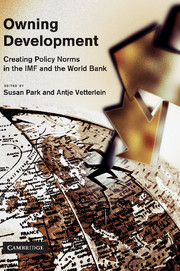Book contents
- Frontmatter
- Contents
- List of figures
- List of tables
- List of contributors
- Preface and acknowledgements
- List of acronyms and abbreviations
- Part One Introduction
- Part Two Norm emergence
- Part Three Norm stabilization
- 5 Lacking ownership: the IMF and its engagement with social development as a policy norm
- 6 Stabilizing global monetary norms: the IMF and current account convertibility
- 7 Bitter pills to swallow: legitimacy gaps and social recognition of the IMF tax policy norm in East Asia
- Part Four Norm subsiding
- Part Five Conclusion
- Bibliography
- Index
6 - Stabilizing global monetary norms: the IMF and current account convertibility
Published online by Cambridge University Press: 02 December 2010
- Frontmatter
- Contents
- List of figures
- List of tables
- List of contributors
- Preface and acknowledgements
- List of acronyms and abbreviations
- Part One Introduction
- Part Two Norm emergence
- Part Three Norm stabilization
- 5 Lacking ownership: the IMF and its engagement with social development as a policy norm
- 6 Stabilizing global monetary norms: the IMF and current account convertibility
- 7 Bitter pills to swallow: legitimacy gaps and social recognition of the IMF tax policy norm in East Asia
- Part Four Norm subsiding
- Part Five Conclusion
- Bibliography
- Index
Summary
Introduction: lessons from history
Policy norms do not appear out of thin air. Experiments with new policy ideas are always grounded in broader material and ideational environment changes, and are shaped by the lessons that actors draw from past experiences. The lessons policy elites draw from history serve both as a useful point of reference to help interpret their changing environment and to lend weight to their arguments for or against particular solutions to new problems in the inevitable political contests that accompany the need for policy change. The conventional wisdom in political science suggests that structural crises open up one-off windows of opportunity that can allow elite actors to achieve radical policy change at a rapid pace (Keeler 1993; Krasner 1984; cf. Broome 2009; Cortell and Peterson 1999). In this regard, windows of opportunity to drive through systemic change are seldom of a greater magnitude than those generated by global shocks such as the Great Depression and the Second World War, which set the scene for current account convertibility to emerge as a policy norm. At the same time, how actors interpret major changes in their environment is crucial for understanding how the material effects of structural crises lead to the emergence of new global policy norms that translate ideas into concrete policy changes (Widmaier et al. 2007).
- Type
- Chapter
- Information
- Owning DevelopmentCreating Policy Norms in the IMF and the World Bank, pp. 113 - 136Publisher: Cambridge University PressPrint publication year: 2010
- 3
- Cited by



